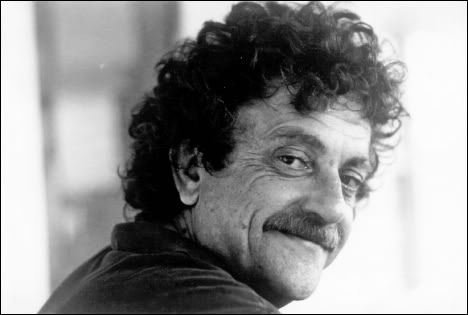I wrote my first book review in July of 1999 for a now defunct paper - the name of which I can't remember. I reviewed Kurt Vonnegut's Timequake (one of my favorite books) in hopes that a few people would read my review and, in turn, read Vonnegut's last novel. And now I'm going to post my review here with the same hope. Hi ho.

We should exclaim out loud whenever we are accidentally happy, said Alex Vonnegut, Kurt’s Uncle. This review is my exclamation. Timequake is the swan song of Kurt Vonnegut’s lengthy writing career. It serves as an exclamation point to his long list of novels and essay compilations. In fact, this book is a novel and an essay compilation. It is its own genre, and genuine – a great summer read.
Originally, Timequake was a failed novel gathering dust on a shelf in Kurt Vonnegut’s New York brownstone. He was unhappy with the complete novel, so Vonnegut whittled it down, slicing away the fat and leaving us with the best morsels. Among these fragments of the original Timequake novel, he added personal opinions, life stories and biting prose. This book is half novel, half memoir – a bipolar journey encompassing a science fiction tale and an author’s reminiscence. Vonnegut does recycle a few past arguments and themes, but nonetheless, Timequake is still much better than 99% of the novels out there.
Not surprisingly, Timequake’s fictional portion revolves around a timequake, a hiccup in the expansion of the universe. The cosmos halts its growth temporarily, reverses slightly and then continues its expansion. This slight reversal forces earth’s inhabitants to relive the past ten years of their lives. Life becomes a rerun. Everyone consciously reenacts ten years of life, second by second, with no divergence. If someone lit their face on fire with a blowtorch the first time around, they would be forced to do it again, all the while remembering the original pain and acrid burnt hair smell.
When the rerun eventually ends, no one knows what to do with their newfound freewill. Pedestrians fall down, failing to complete their strides. Planes plummet, cars crash and chaos ensues. And through it all romps Kilgore Trout, Vonnegut’s recurring science fiction writer – his alter ego.
Among the social pandemonium and odd antics of Kilgore Trout, Vonnegut places his own opinions and anecdotes. He mocks life and death, but revels in the details they contain. He states his belief in the extended family and its ever-increasing need in our barren technology-driven society – Vonnegut says that when couples fight, it isn’t about money or sex or power. What they are really saying is this, “You’re not enough people!”
Vonnegut writes about the lives of his parents, siblings and wives – and their deaths. So it goes. He throws out one-liners and dirty jokes. He adds four amendments to the U.S. Constitution. He embraces humanism and criticizes religion, but also defends its place in society. He comments on nuclear holocaust – realizing the unfortunate need for bombing Hiroshima, but fiercely criticizing the Nagasaki attack. He is irreverent and iconoclastic, but at the same time caring and sentimental. He is my generation’s Mark Twain.

We should exclaim out loud whenever we are accidentally happy, said Alex Vonnegut, Kurt’s Uncle. This review is my exclamation. Timequake is the swan song of Kurt Vonnegut’s lengthy writing career. It serves as an exclamation point to his long list of novels and essay compilations. In fact, this book is a novel and an essay compilation. It is its own genre, and genuine – a great summer read.
Originally, Timequake was a failed novel gathering dust on a shelf in Kurt Vonnegut’s New York brownstone. He was unhappy with the complete novel, so Vonnegut whittled it down, slicing away the fat and leaving us with the best morsels. Among these fragments of the original Timequake novel, he added personal opinions, life stories and biting prose. This book is half novel, half memoir – a bipolar journey encompassing a science fiction tale and an author’s reminiscence. Vonnegut does recycle a few past arguments and themes, but nonetheless, Timequake is still much better than 99% of the novels out there.
Not surprisingly, Timequake’s fictional portion revolves around a timequake, a hiccup in the expansion of the universe. The cosmos halts its growth temporarily, reverses slightly and then continues its expansion. This slight reversal forces earth’s inhabitants to relive the past ten years of their lives. Life becomes a rerun. Everyone consciously reenacts ten years of life, second by second, with no divergence. If someone lit their face on fire with a blowtorch the first time around, they would be forced to do it again, all the while remembering the original pain and acrid burnt hair smell.
When the rerun eventually ends, no one knows what to do with their newfound freewill. Pedestrians fall down, failing to complete their strides. Planes plummet, cars crash and chaos ensues. And through it all romps Kilgore Trout, Vonnegut’s recurring science fiction writer – his alter ego.
Among the social pandemonium and odd antics of Kilgore Trout, Vonnegut places his own opinions and anecdotes. He mocks life and death, but revels in the details they contain. He states his belief in the extended family and its ever-increasing need in our barren technology-driven society – Vonnegut says that when couples fight, it isn’t about money or sex or power. What they are really saying is this, “You’re not enough people!”
Vonnegut writes about the lives of his parents, siblings and wives – and their deaths. So it goes. He throws out one-liners and dirty jokes. He adds four amendments to the U.S. Constitution. He embraces humanism and criticizes religion, but also defends its place in society. He comments on nuclear holocaust – realizing the unfortunate need for bombing Hiroshima, but fiercely criticizing the Nagasaki attack. He is irreverent and iconoclastic, but at the same time caring and sentimental. He is my generation’s Mark Twain.
